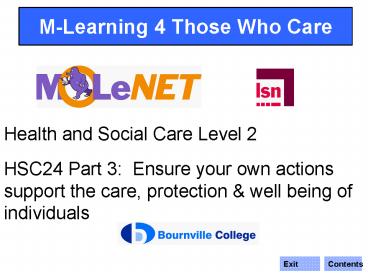MLearning 4 Those Who Care PowerPoint PPT Presentation
1 / 15
Title: MLearning 4 Those Who Care
1
M-Learning 4 Those Who Care
Health and Social Care Level 2
HSC24 Part 3 Ensure your own actions support
the care, protection well being of individuals
2
Contents
3
Knowledge Evidence
- This information pack provides information on the
following
4
Types of Abuse
- Abuse can occur when an individual is deprived of
the right to
- Choose
- Privacy
- Independence
- A decent quality of life
- Protection safety
Abuse can be the result of one serious incident
or an accumulation of less serious incidents.
5
Physical Abuse
- This includes
- Injuries, which are unexplained, intentional or
not prevented by another person. - Internal or external injuries caused by assault
(including inappropriate restraint). - Using incorrect moving handling techniques.
- Improper use, or denial, of medication,
deliberate poisoning.
6
Sexual Abuse
- This includes
- Sexual activities without consent or which causes
distress. - Activities which violate social/family taboos.
- Illegal activities
- Non-contact abuse e.g. photography, indecent
exposure, sexual teasing, innuendo, sexual
harassment. - Contact abuse touching, masturbation,
penetration or attempted penetration.
7
Emotional Abuse
- This includes
- Anguish caused by threatening behaviour,
harassment, humiliation or neglect. - Verbal abuse threats, bullying, racism, etc.
- Deprivation of normal contact.
- Involuntary withdrawal from a valued activity.
- Failure to respond to emotional needs.
- Failure to protect from emotional or
psychological abuse. - Forcing a person to perform inhumane tasks.
8
Physical Neglect
- This includes
- Neglect to the extent that an individuals
health, development or general well-being is
affected. - Denial of an individuals access to appropriate
care professionals (ie. Social Services or
medical staff). - Denial of food, shelter, warmth sleep.
9
Abusers (1)
- Vulnerable adults may be abused by a wide range
of people, including relatives, professional
staff, paid care workers, volunteers, other
service users, neighbours, friends associates,
or people who deliberately exploit vulnerable
people strangers. Abusers can be
- Individuals
- Groups
- Organisations
10
Abusers (2)
- Agencies may also have responsibilities regarding
the perpetrators of abuse. This will vary
depending on whether the perpetrator is a
- Member of staff, proprietor, service manager or
another service user - Member of a recognised professional group.
- Stranger, relative, neighbour, friend of the
abused individual - A carer (i.e. eligible for assessment under the
Carers Recognition Services Act)
11
Why?
- Abuse can occur in the care setting when
- Staff are poorly trained or untrained
- There is little or no management supervision or
support - Staff work in isolation
- There are inadequate numbers of staff to cope
with the workload - There are inadequate security arrangements
- There is no key worker system good
relationships are not formed between staff
service users
12
Long Term Effects
Abuse can cause people to lose their self esteem
confidence. They can become angry, withdrawn
or difficult to communicate with, make excuses or
tell lies. They may experience difficulty in
sleeping or nightmares a demonstrate a loss of
interest in their appearance. Symptoms can
become long lasting, if not permanent.
13
Suspecting Abuse
If you suspect abuse you need to take action
- Report the abuse to your manager
- If you suspect your manager is involved, or will
not take action, refer it to the most senior
manager who is likely to be impartial - If there is no-one in the workplace to report it
to you should contact Social Services - If nothing is done, refer your concerns to the
Commission for Social Care Inspection
14
POVA
- The Protection of Vulnerable Adults (POVA) scheme
is set out in the Care Standards Act 2000. - It creates a list of people, held by the
Secretary of State, who are considered unsuitable
to work with vulnerable adults in England
Wales. - Carry out research to find out more about POVA.
15
Summary
- You have now finished this Information Pack and
should know more about the different types of
abuse, who is likely to abuse the effects it
has on your service users. - Should you need any further help with this part
of the unit please email your assessor by
clicking on the link below
Click here to email your assessor

